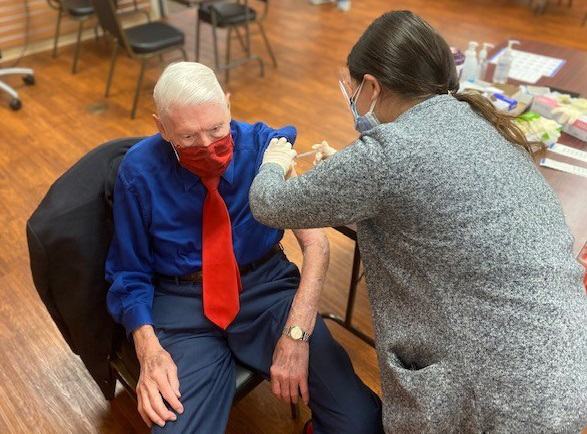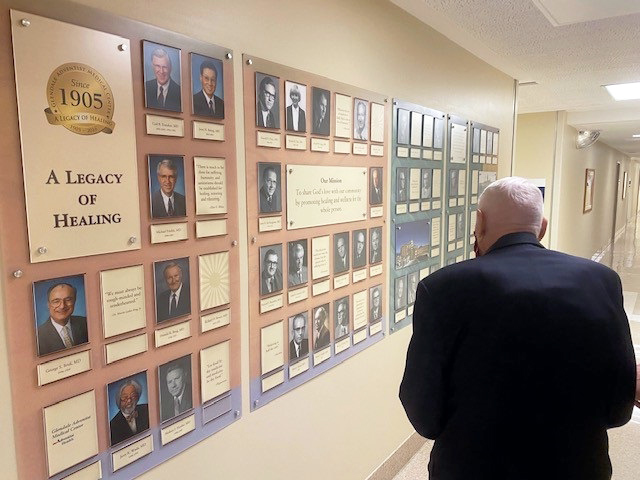
Photo provided by Glendale Adventist
By Mary O’KEEFE
Herbert Harder said his interest in medicine began “the day I was born.” Which, when you consider was 100 years ago, is a very long love of the medical profession.
Actually it was when he was 7 years old that he really knew he wanted to be a doctor. Eventually that led him to medical school in 1946, after he served in the U.S. Navy in WWII.
His career has been centered at Glendale Adventist Hospital. When he started his career there it was called the Glendale Sanitarium.
“There were six parking spaces out front and maybe 20 for doctors out back,” he said in a hospital press release.
Over the years he has seen several changes.
“Well, when I was a medical student we had just five girls in the class,” he said in an interview with CVW. He added he has been happy to see an increase in the number of women in the medical field. He also notes that “back then” a day rate for a stay at the hospital was $10 – something else that changed over the years.
Recently he rolled up his sleeve to receive his COVID-19 vaccine.
“I didn’t feel any reaction from that [vaccine],” he adding, “I believe strongly in vaccinations.”
He remembered when his children got their first polio vaccinations, in the 1950s, which were administered orally at the time. He made certain his children got the vaccine as soon as possible.
“Polio was a very bad scourge,” he said.
He added that COVID-19 has been one of the worst pandemics he has seen; the next worse would be the 1918 Spanish flu pandemic. The COVID-19 pandemic will change life in the foreseeable future, he said. He believes there is a need to continue the safety measures currently in place like social distancing and the wearing of face coverings.
The majority of Harder’s career has been in pathology. Although Dr. Harder retired prior to her working at Glendale Adventist, fellow pathologist Dr. Michele Cosgrove said he continues to inspire. Cosgrove joined Glendale Pathology Associates, of which Harder was founder.
“He came by regularly,” she said.
Harder’s inspiration came from his work in Glendale as well as his missionary work. His family traveled around Africa during their mission and then, after his retirement, he volunteered as a pathologist in Kenya and Tanzania.
Cosgrove added that Harder would bring cases to Glendale from his missionary work in east Africa. She said that often these areas in Africa did not have access to pathology and his skills were appreciated.
“So [in Africa] a surgeon could help a patient by removing a [tumor] but wouldn’t be able to have pathology available,” Cosgrove said. Dr. Harder provided that expertise in Africa. Pathology is the science of the causes and effects of diseases, according to the Oxford dictionary.
A pathologist specializes in the body’s fluids and tissues. Pathologists perform autopsies to identify or confirm disease and causes of death but also interpret samples of tissue, like tumors, during surgery.
“That is what [Harder] has been doing during his retirement,” Cosgrove said.
His work helped those in Africa but also helped doctors in Glendale as Harder would introduce cases that normally the pathologists would not see in California, like some forms of tropical diseases. He also worked at the beginning of the HIV/AIDS epidemic in Africa, which provided valuable knowledge as HIV spread throughout the world.
“He is a wealth of information … an expert in his field,” she said. “What I saw in Dr. Harder was [volunteering] was truly his calling.”
That calling, and his dedication, has inspired several of the pathologists at Glendale Adventist to also travel to Africa to volunteer.
Cosgrove added that Harder is a “very proud” member of the Seventh-day Adventist Church.
“He is really a religious and spiritual man,” she said. She added she sees him embracing all people and offering help to all.
Harder has stayed busy during his retirement including enjoying his hobbies of bird watching and woodworking. Perhaps staying active is why he is now a centenarian but he has also been a vegetarian all of his life; however, he did admit to smoking.
“I smoked for two hours one evening when I was a dumb teenager,” he said.
He probably shouldn’t worry too much about that one brief vice.

